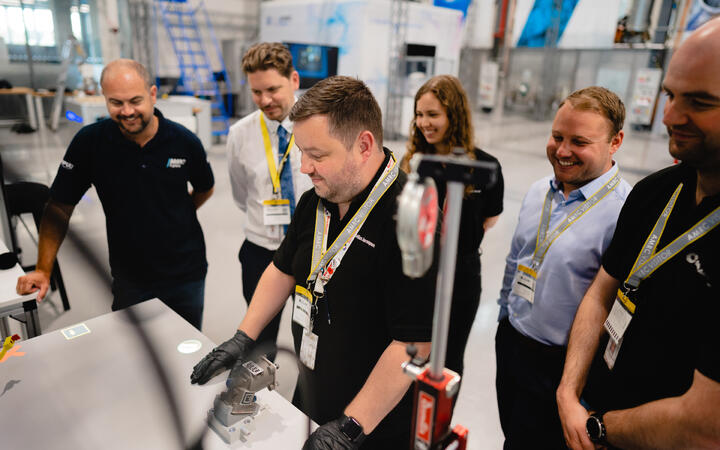AMRC Cymru helps build smart production lines for aerospace
29 November 2023A new concept assembly process has been developed by University of Sheffield AMRC Cymru for world leading aerospace manufacturer Collins Aerospace for their actuation systems site in Wolverhampton.
Article featured in the latest issue of the AMRC Journal.
AMRC Cymru, part of the University of Sheffield Advanced Manufacturing Research Centre (AMRC), was tasked with developing a Smart Assembly and Inspection Demonstrator (SAID) for Collins Aerospace’s state-of-the-art factory in Wolverhampton.
Having been given a deadline of just ten weeks, AMRC Cymru, based in Broughton, North Wales, successfully achieved its objective, utilising and uniting computer-aided design (CAD) with existing technological systems such as the LightGuide Smart Workbench – including projector, monitor and camera - and DIOTA augmented reality software.
The result was a hi-tech Smart Workstation which can operate in any language, enabling workers of all experience and abilities to assemble a gearbox via a much simpler, paperless method.
Collins Aerospace implemented a demonstration station at its Midlands site, housed in its technology development area, and hosted a number of sessions with people throughout the organisation.
The Smart Workstation solution is designed to analyse processes to improve efficiency and provide insight into alternative, more efficient paths forward. The programme-controlled build process helps maintain compliance with the approved manufacturing and assembly method.
From a training and flexibility perspective, a person can operate the Smart Workstation with limited experience and be taught the build process step-by-step, which ensures process outputs are consistent. Being very intuitive, the potential of the technology can also help improve operations efficiency and quality while improving health and safety of operators.
With direction from the LightGuide, and such an easy-to-follow process which logs time and every step and movement of the manufacturing process, the general consensus among users who tested the demonstrator was that it would have a ‘significant and beneficial’ impact.
Gareth Towlson, senior manufacturing research engineer at AMRC Cymru, a member of the High Value Manufacturing Catapult network, led the team at the Broughton facility to ensure the workstation has the capacity to be tailored to a variety of requirements.
“To see the Smart Workstation already in development at Wolverhampton is fantastic, it’s testament to how hard we have worked in partnership to find a solution, within budget and deadline,” said Gareth.
“We had a vision but ultimately it is their product, their factory and their workforce so we had to ensure it was bespoke to their needs, and through collaboration we have done so successfully.”
He added: “We’ve already had interest from other sectors and high-value manufacturers as the technology can be applied in many different ways.
“Through our dedicated and experienced team of research engineers we have the skills and expertise to work with customers in any arena, to meet critical timescales and exceed their goals. That’s something we will be looking to achieve with other organisations in the future.”
Read the full case study here.



